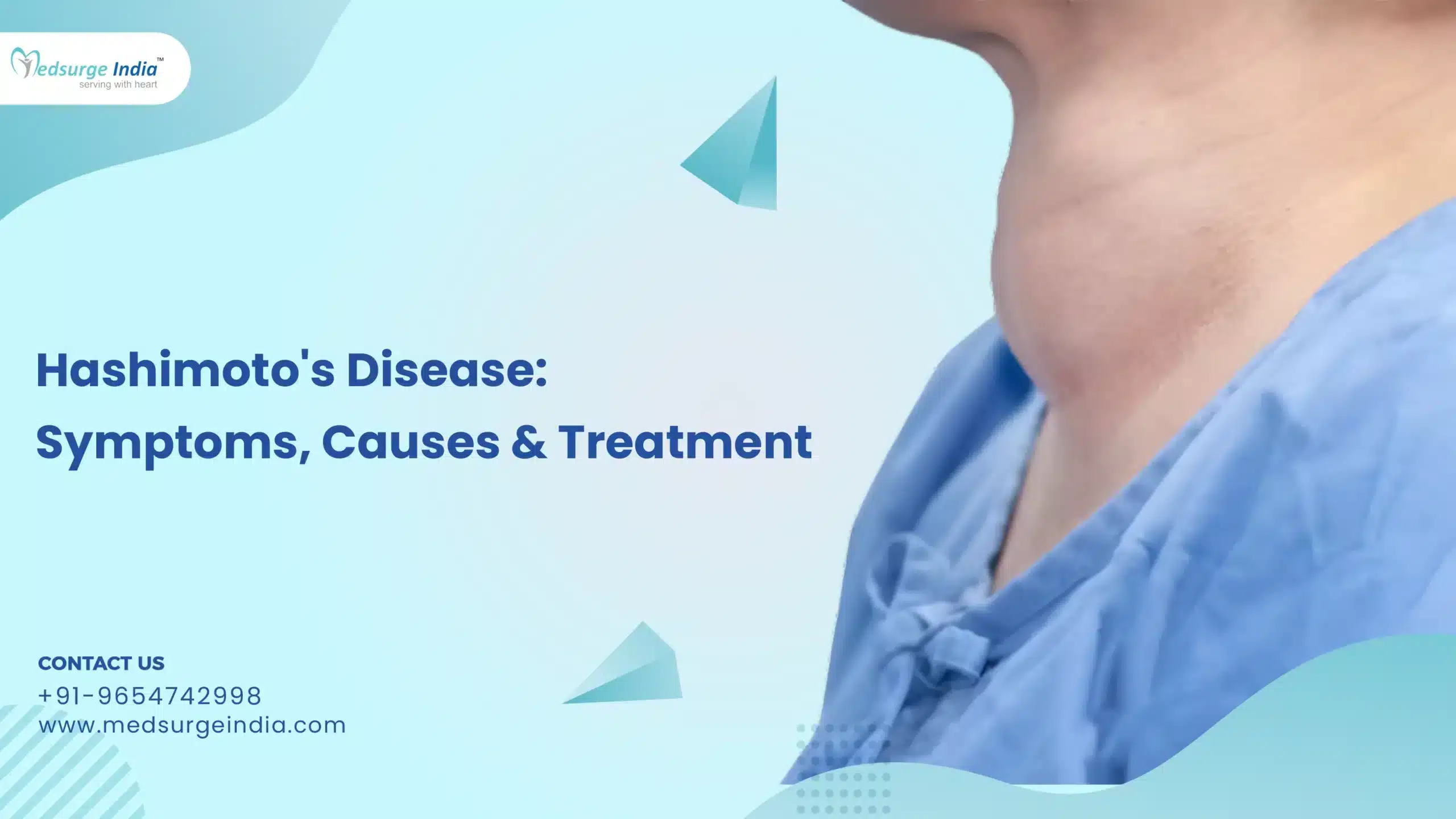
Hashimoto’s Disease is a chronic autoimmune disorder that affects the thyroid gland. It is also known as Hashimoto’s thyroiditis, chronic lymphocytic thyroiditis, or autoimmune thyroiditis.
The thyroid glands produce hormones, T4 (thyroxine) and T3 (triiodothyronine), which help in regulating various body functions, including metabolism, growth, and development.
However, in Hashimoto’s disease patients, hormone-producing thyroid cells are affected by their own immune system (autoimmune disorder). This will reduce the production of the essential hormone, which may lead to hypothyroidism. This will affect the normal functioning of the thyroid gland, thus impacting the patient’s daily life.
Anyone can get affected by this; however, middle-aged women are commonly impacted.
Symptoms
In some people, there may be no symptoms at first, but the condition can progress slowly. The first sign of disease is the enlargement of the thyroid gland, called goitre, a non-cancerous condition that causes the front of the neck to appear swollen.
At the beginning, symptoms of Hashimoto’s disease are often mild or go unnoticed, but tend to become more prominent as the condition progresses. The following are common symptoms:
- Fatigue
- Weight gain
- Cold intolerance
- Constipation
- Dry skin
- Puffy face
- Depression or low mood
- Slow heart rate
- Thinning hair or hair loss
- Hoarseness
- Joint or muscle pain
- Memory issues or difficulty concentrating (“brain fog”)
- Irregular or heavy menstrual periods
- Problem in pregnancy
- Swelling in the neck (due to thyroid enlargement)
However, some of the symptoms overlap with other conditions; thus, it is advised to see your doctor first.
Causes and Risk Factors
Hashimoto’s disease is an autoimmune disease in which the body’s immune system targets its cells and organs. The actual cause of Hashimoto’s disease is unknown; several factors are believed to increase the risk of developing the condition.
- Genetics: It is considered the primary cause. If you have a family history of thyroid or autoimmune diseases, it increases the risk.
- Gender: Women are more prone than men.
- Age: Anyone can get affected; however, it often appears in middle-aged individuals.
- Excess iodine intake: High iodine intake may trigger the condition in some people.
- Radiation exposure: Persons who are exposed to environmental radiation are at higher risk.
- Other autoimmune conditions: Hashimoto’s disease is often associated with other autoimmune conditions such as Type 1 Diabetes, Lupus, Rheumatoid Arthritis, Addison’s Disease, Graves’ Disease, and many more.
Diagnosis of Hashimoto’s Disease
If you have Hashimoto’s disease, your doctor may first notice the goitre, and to further confirm this, one or two of the following tests are advised. Also, certain diseases can be misdiagnosed as Hashimoto’s; these include
- Chronic Fatigue Syndrome
- Non-autoimmune hypothyroidism
- Subacute thyroiditis
- Depression
- Fibromyalgia
- Premenstrual syndrome (PMS)
Listed are the Hashimoto’s disease diagnostic tests.
- Thyroid Stimulating Hormone (TSH): TSH is produced by the pituitary gland to stimulate higher production of thyroid hormone by the thyroid gland. However, a high TSH level will indicate hypothyroidism.
- Thyroxine test (T4): Measures the level of thyroxine hormone produced by the thyroid gland. Low levels may indicate hypothyroidism caused by Hashimoto’s disease.
- Antibody test: Detects thyroid-specific antibodies such as anti-TPO (thyroid peroxidase antibodies) and anti-Tg (thyroglobulin antibodies), which are typically elevated in Hashimoto’s thyroiditis.
Sometimes, doctors may suggest that you go for the imaging tests to estimate the size of the thyroid and nodules, if any.
Treatment of Hashimoto’s Disease
If you are diagnosed with Hashimoto’s thyroiditis but don’t have hypothyroidism, your doctor will not start any medication but rather regularly monitor your symptoms and thyroid level. And if you have Hashimoto’s with hypothyroidism, then hormone replacement therapy is given.
Hormone Replacement Therapy
In hormone replacement therapy, medications like levothyroxine are given. This helps to normalise the thyroid hormone level in the blood.
Levothyroxine is a synthetic form of the T4 hormone. The dosage depends on the patient’s age, weight, severity, and any other health issues or medications that the patient is already taking.
The T4 from levothyroxine is converted to triiodothyronine (T3), similar to how the naturally present T4 hormone works. However, for some people, synthetic T-3 hormone (Cytomel) or a synthetic T-4 and T-3 combination is also used to stabilise the condition.
Although some of the medications, like antacids and calcium or iron supplements, can impact the absorption of the levothyroxine. Some foods, such as high-fibre foods and soy products, have a similar impact.
“Consult the Best Endocrinologist in India for accurate diagnosis and personalized treatment of Hashimoto’s Disease.”
Complications
If Hashimoto’s disease remains untreated, it may lead to the following complications.
- Goitre – Enlargement of the thyroid gland due to constant stimulation by TSH.
- Hypothyroidism – A significant decrease in thyroid hormone production.
- Heart problems – Including high cholesterol, enlarged heart, and increased risk of heart failure.
- Mental health issues– Such as depression, slowed thinking, and memory problems.
- Infertility and pregnancy issues – Miscarriage, premature birth, or developmental issues in the baby.
- Myxedema – A rare, life-threatening condition caused by severe, untreated hypothyroidism.
Also Know: Hormone Therapy Cost In India
Takeaway
Hashimoto’s disease is a common autoimmune thyroid disorder that gradually affects thyroid function, often leading to hypothyroidism. While it develops slowly, early diagnosis and consistent treatment with thyroid hormone replacement can effectively manage symptoms and prevent complications. With regular monitoring, a healthy lifestyle, and proper medical care, individuals with Hashimoto’s can lead normal, healthy lives. Though there is no cure, the condition is highly manageable, making awareness and timely intervention crucial.



 (1).png)